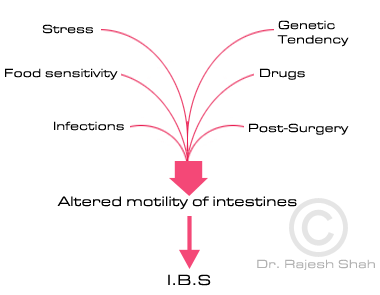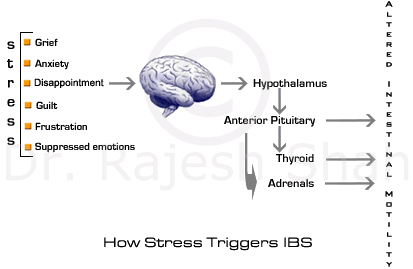Causes of Irritable Bowel Syndrome (IBS)

The cause of IBS is not known. Doctors call it a functional disorder because there is no sign of disease such as inflammation or infection when the colon is examined.
With aggressive research done in this area over a period of time, scientists have come to the conclusion that the cause of IBS may be multifactorial, the cumulative effect of which results in the derangement of the normal functioning of the bowel.
The underlying cause of this disorder is an abnormality of the intestinal muscle contraction. In IBS, the intestines may not function normally, either contracting too forcefully or weakly, too slowly or rapidly.

The factors that can adversely affect the job of the bowel are as follows:
01 Psychological factors: Patients with IBS report increasing symptoms during the events of stress, and many patients with IBS report that their symptoms began during periods of major life stressors such as a divorce, the death of a loved one, school exams, or after moving to a new job or city. About 50% of patients exhibit a range of emotional disturbances, including anxiety, depression, and neurosis.
It is a known fact that our emotions and intestines are interwoven. The brain and the intestines are closely connected by nerve fibers that control the functioning of the intestines. It is believed that in IBS the communication between brain and gut may be impaired.
02 Sensitivity to food: Symptoms of IBS have also been known to be triggered by the ingestion of certain foods to which the individual is sensitive. Chocolate, milk products, caffeine, or large amounts of alcohol are frequent offenders. One theory states that lack of fiber in the diet can have a detrimental effect. This lack of fiber causes irregular contractions of the large intestines.
03 Genetics and heredity: Some studies indicate that there are more chances of IBS running in a family. It is believed that there are some inborn tendencies of an individual that make him/her react adversely to stress or certain foods, resulting in IBS.
04 Some patients develop IBS following an episode of gastroenteritis or abdominal surgeries like removal of the gallbladder.
05 Researchers have also found that women with IBS may have more symptoms during their menstrual periods, suggesting that reproductive hormones can increase IBS symptoms
06 Conventional medicines: Many patients with IBS report worsening of their symptoms following the use of some of the conventional medicines like antibiotics, steroids, anti-inflammatory medicines, etc.
Written & Approved by-
Dr. Rajesh Shah
M.D. (Hom.)